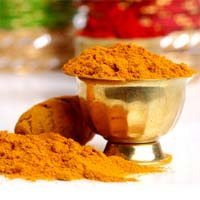Component in Spice May Help Slow Mesothelioma Growth
 Yet another study has demonstrated the potential mesothelioma-fighting properties of curcumin, an anti-inflammatory polyphenol that is the primary component in the spice turmeric. The latest study suggests that applying curcumin along with cancer-fighting peptides may increase the levels of a protein inhibitor that can slow the progression of mesothelioma.
Yet another study has demonstrated the potential mesothelioma-fighting properties of curcumin, an anti-inflammatory polyphenol that is the primary component in the spice turmeric. The latest study suggests that applying curcumin along with cancer-fighting peptides may increase the levels of a protein inhibitor that can slow the progression of mesothelioma.
Mesothelioma is usually caused by exposure to the mineral asbestos. Tens of thousands of people contract this aggressive cancer annually. Many of them worked in industries that used asbestos heavily before it was revealed to cause mesothelioma.
Cancer researchers around the world continue to work on a way to slow the cancer, which often claims the lives of patients within a year of diagnosis. The latest study was conducted by doctors at Case Comprehensive Cancer Center in Ohio and the Georg-Speyer-Haus Institute for Biomedical Research in Germany. They focused on STAT3, an intracellular protein that can trigger the onset of cancers and fuel their growth, and a STAT3 neutralizer called PIAS3.
Investigators found that people with lower levels of PIAS3 had higher STAT3 levels, and a higher chance of dying from their mesothelioma. They also found that, when they administered curcumin and peptides extracted from PIAS3 to malignant mesothelioma cells in the lab, STAT3 levels went down and the mesothelioma cells began to die.
“Our findings suggest that PIAS3 expression positively affects survival in mesothelioma patients and that PIAS3 activation could become a therapeutic strategy,” says Afshin Dowlati, MD, Professor of Medicine at Case Western Reserve University School of Medicine and member of the Case Comprehensive Cancer Center. “Our interest for the future is that we want to find better, more simple ways to increase intracellular levels of PIAS3 for malignant mesothelioma through the use of synthetic PIAS3 peptide or curcumin analogs.”
Dr. Dowlati says curcumin analogs are needed because people do not absorb curcumin when they eat the spice turmeric. Earlier this year, Turkish researchers who used such an analog along with a transplant drug to treat mesothelioma found that the combination helped protect healthy cells against the damaging effects of chemotherapy.
The new research was supported in part by the National Institutes of Health and was published in Clinical Cancer Research.
Source:
Curcumin, cancer-inhibiting peptides show promise in slowing progression of mesothelioma, September 18, 2014, Case Western Research University School of Medicine, News Release
Dabir, S et al, “Low PIAS3 Expression in Malignant mesothelioma is associated with increased STAT3 activation and poor patient survival”, August 14, 2014, Clinical Cancer Research, Epub ahead of print





